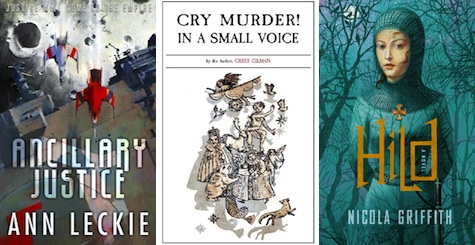It’s hard to believe that the year is already drawing to a close. Time seems to go faster with every year; does anyone else notice that? An artefact of perception: the more time we experience, the faster it seems to pass, relative to previous time. There’s something quite fantastical about that.
But musings on the fantastical nature of perceived time aside, this is the season to look back on 2013 and pick out the best of the year—according to me.
Going into 2013, there were three books I really looked forward to ahead of time: Elizabeth Bear’s Shattered Pillars, Marie Brennan’s A Natural History of Dragons, and Nicola Griffith’s Hild. All of them more than lived up to my expectations. But there were so many things whose excellence I really didn’t anticipate in advance. So very many things: 2013 has been such a good year for new books for me, I can’t imagine 2014 will be able to better it.*
*It makes up, a little, for the ways in which 2013 has been a completely crappy year.
For example: Aliette de Bodard’s On A Red Station, Drifting. It’s a novella that still takes me aback with its quiet tension, its re-imagining of science fictional possibilities in familial conjunctions, and its tight, clever prose. Or, another example, Greer Gilman’s lustrous Cry Murder! In A Small Voice, with its glittering turns of phrase, Shakespearian language, intoxicating imagery: a small beautiful thing.
I really didn’t expect to respond as strongly as I did to Roz Kaveney’s Rituals and Reflections, the second of which came out this autumn. It’s not often these days that I read something that short-circuits the critical impulse and goes straight to I love this; that bypasses the intellect (at least for a while) and goes right for the heart. But Kaveney’s novels have done exactly that, and I cannot speak a word against this marvellous, playful, entirely queer-friendly re-imagining of history and mythology. It was a highlight of my literary year.
The other highlight was, of course, Ancillary Justice, Ann Leckie’s debut novel. It, too, short-circuited all my critical impulses to become immediately beloved, leaving in its wake unmitigated enthusiasm. I could find things to nitpick in this novel, but why should I? They would be tiny, tiny things compared to the vast flood of my enthusiasm. If you haven’t read it already, read it now.
Honourable mentions go to Elizabeth Bear’s Book of Iron, Nalo Hopkinson’s Sister Mine, and Andi Marquette’s The Edge of Rebellion—things published in 2013 with which I also fell in love.
2013 also had Tomb Raider. The first major game I’ve ever seen to build part of its emotional core and narrative arc around female friendship, it had really great gameplay mechanics, drawing on the FPS model, some brilliant visuals, and a solid survival-oriented plot—with fantastic elements. I’ve played very very few games that’ve ever made me quite this happy.
What about film? Well, personally speaking, I haven’t seen everything—like Gravity, which I managed to miss in cinemas—but Guillermo del Toro’s Pacific Rim thrilled me with giant monsters, giant robots, and subtle undermining of the standard Hollywood Lone Hero narratives. And I wish there were more characters like Mako Mori. A hat tip to Thor: The Dark World for actually having four separate well-defined female characters. And as for The Hunger Games: Catching Fire… well, it’s a flawed film, an imperfect adaptation, but still! So very good: it’s not every day we get a role that offers so much range for a female actor, nor see it filled by someone who can carry it off. As much as I enjoyed the novel, I find I enjoy the film more: there is a harshness to its landscapes that effortlessly conveys a desperation of mood — and it’s interesting, for once, to see cinema cast a boy in the role of the emotional one, the one in need of rescue, when his female counterpart gets to be the strong silent type.
2013 also finally kicked Melissa Scott over the threshold of my TBR pile and into the ranks of writers whose entire backlist I need to read. Five-Twelfths of Heaven and its sequels is one of the oddest, most entertaining space operas I’ve yet had the privilege of reading: it’s science fiction, all right, but the science fiction of Hermetic science, where alchemy and symbology, the logic of correspondences and the music of the spheres, meets spacecraft and interstellar empires and pirates and quests for lost planets. PEOPLE. Why did no one ever tell me about this trilogy before? It is filled with things that delight all my geekeries.
That’s pretty much the sum of my year, dear readers. What about yours?
Liz Bourke is a cranky person who reads books. Her blog. Her Twitter.










